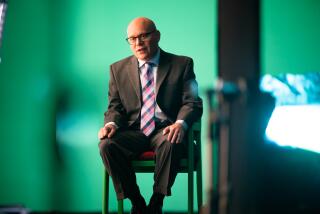‘Bedlam’ shows us what we’ve done to our mental health system

- Share via
Two motion pictures played a role in the descent into disrepute and the final demise of state mental hospitals. The first was “Titicut Follies,” a 1967 documentary about inmates in the Bridgewater State Hospital for the criminally insane in Massachusetts. Legal action prevented its wide release, but it was viewed by physicians and policymakers who were shocked by scenes of inmates being ridiculed and abused by hospital staff.
The second was “One Flew Over the Cuckoo’s Nest,” the 1975 feature based on Ken Kesey’s novel set in a fictional mental hospital in which the patient abuse is at least as much to their spirits as to their bodies. The film was widely seen by the American public and won multiple Oscars, including best picture, director, actor and actress.
By the time “Titicut” was viewed by its narrow audience and “Cuckoo’s Nest” hit packed theaters, state mental hospitals were already vanishing. Many indeed had been abusive, and the film underscored the national attitude: Good riddance.
But what replaced them? In one of his last official acts before his assassination, President John F. Kennedy signed a bill intended to create a system of community-based mental health clinics that would provide outpatient treatment and reintegrate the mentally ill into society.
Today, however, the nation’s largest mental health treatment facilities are jails: Los Angeles’ Twin Towers, Chicago’s Cook County Jail and New York’s Riker’s Island. Patients are admitted to treatment only upon arrest, usually for some behavior that occurs during a breakdown. If they are lucky, they are taken by police following a call from guilt-stricken but terrified family members who cannot calm their loved ones in the midst of a psychotic episode. The less fortunate are arrested after a direct encounter with law enforcement and could face hard prison time for violent crimes.
Much has been written about the shame of America’s failed mental health system, including the book “Bedlam,” by psychiatrist Kenneth Paul Rosenberg. The book chronicles Rosenberg’s quest to uncover how we got to this point, in which the chief route to mental health treatment is a call to 911. The journey began with the mental illness of his sister, Merle, and the tragic inadequacy of the nation’s care system to save her — and tens of thousands of others.
“Bedlam” is also a film, and it premieres Monday night at 10 p.m. on PBS’ Independent Lens (check your local listings). It helps bring American audiences up to speed on their mental health care system 45 years after “Cuckoo’s Nest.”
In the film as in the book, Rosenberg documents the difficult lives of patients and their interactions with hospital staff, law enforcement officers and judges. It follows them to jail and to the streets. The scenes are harrowing and hard to watch.
Perhaps the film’s most remarkable scenes focus on Monte Cullors, not just because of the troubled but resilient man that he is and his persistence through court hearings and homecoming celebrations but also because of who his greatest advocate is. His sister, Patrisse Cullors, has transformed her fierce campaigning on her brother’s behalf into a movement to remake Los Angeles County’s jails as well as its program of mental health care. In telling Monte Cullors’ story, Rosenberg’s film pulls together what might otherwise seem like disparate issues — incarceration, mental illness, homelessness, policing, poverty, race — into the unified systemic breakdown that it is.
“Bedlam” is more of a wake-up call than a prescription for how to fix the broken system.
Our healthcare financing system limits the number of mental health care patients who can stay overnight at treatment clinics. As a result, few such clinics can get sufficient revenue to operate. But these limits don’t apply to jails, so they fill up with psychiatric patients.
Rosenberg emphasizes that there is a stark lack of funding not just for treatment but for research. The seriously mentally ill account for a greater cost burden than all other noncommunicable diseases, such as cancer and heart disease, combined.
More research, more resources, more advocacy — all are needed.
Plus, a broader understanding of the problem in all its complexity. “Bedlam” helps with that, and it deserves to have some of the resonance that those other films had so many decades ago.
More to Read
A cure for the common opinion
Get thought-provoking perspectives with our weekly newsletter.
You may occasionally receive promotional content from the Los Angeles Times.









